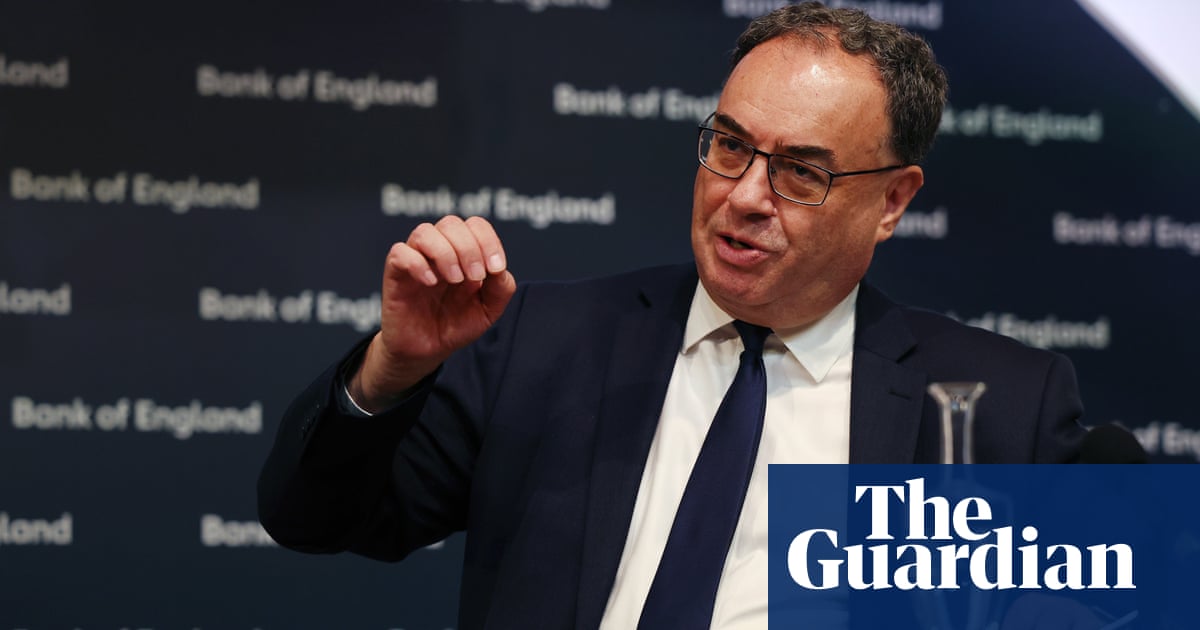The governor of the Bank of England, Andrew Bailey, has shrugged off a smaller-than-expected drop in inflation last month, saying he expected a sharp fall towards the government’s 2% target next month.
Speaking in Washington after news that the government’s preferred measure of the cost of living had eased to 3.2% in March, Bailey said the path of inflation was broadly in line with what Threadneedle Street had predicted in its quarterly health check on the economy.
Financial markets had predicted a bigger drop in the annual rate to 3.1% and saw the latest data on price pressures as putting back the timing of interest rate cuts.
But Bailey said: “We are pretty much on track with where we thought we would be – a bit under in February and a bit over in the latest figures. Next month will see quite a strong drop.”
While the UK was experiencing strong disinflation, the governor said the fall was unbalanced. He said that in April household energy bills were likely to be 25% lower than a year earlier, but service sector inflation is running at 6%. Decisions on interest rates would be influenced by service sector inflation, earnings growth and the state of the labour market, he said.
“It looks like we are getting a loosening of the labour market,” Bailey said after this week’s news of a rise in the unemployment rate to 4.2%. “But we are disinflating at full employment.”
Bailey’s comments followed the release of data showing the annual inflation rate at its lowest level since September 2021 – helped by food prices rising more slowly than a year earlier.
Investors reacted to the March figure by trimming bets for an imminent reduction in borrowing costs, pricing in the first quarter-point rate cut in September or November. A matter of weeks ago, investors had been expecting a first cut in June.
The Bank has raised interest rates to 5.25% as it tries to bring CPI inflation back down to its target of 2%. However, on Wednesday, Megan Greene, an independent economist on the Bank’s nine-strong rate-setting committee, told an event in Washington that recent tensions in the Middle East could pose a risk to achieving that aim, including by heightening inflation expectations.
“I do think that what’s going on in the Middle East does pose a risk,” Greene told the Institute of International Finance. “I’m worried about the sort of an energy price shock and other supply-side shock, which obviously follow a number of supply-side shocks we’ve seen over the past couple of years, and what that might do to inflation expectations.”
The ONS said cooling inflation in food and drink prices contributed most to the decline, after a fall in the prices of bakery products including chocolate biscuits and crumpets. However, this was offset by rising fuel prices and stubbornly high inflation in services prices. A reduction in the rate of inflation does not mean that prices are falling, just that they are rising more slowly.
after newsletter promotion
The latest snapshot showed consumer prices continuing to rise across a broad range of categories, including car insurance, which soared by almost 30% compared with a year earlier. The cost of mobile phone and broadband packages also shot up, while prices for hotels, beer and other alcoholic drinks also rose.
Rachel Reeves, the shadow chancellor, said the figures showed households remained worse off. “Prices are still high in the shops, monthly mortgage bills are going up and inflation is still higher than the Bank of England’s target,” she said.
The chancellor, Jeremy Hunt, said: “The plan is working: inflation is … down from over 11% to 3.2%, the lowest level in nearly two and a half years, helping people’s money go further.”
The latest snapshot from the ONS showed that core inflation – which excludes energy, food and tobacco prices and is closely monitored by the Bank – slowed to 4.2% from 4.5% in February, but remained higher than forecast by City economists and the Bank.
Services inflation, which the Bank also watches closely, eased slightly to 6% from 6.1% a month earlier, but was also marginally higher than predicted.

